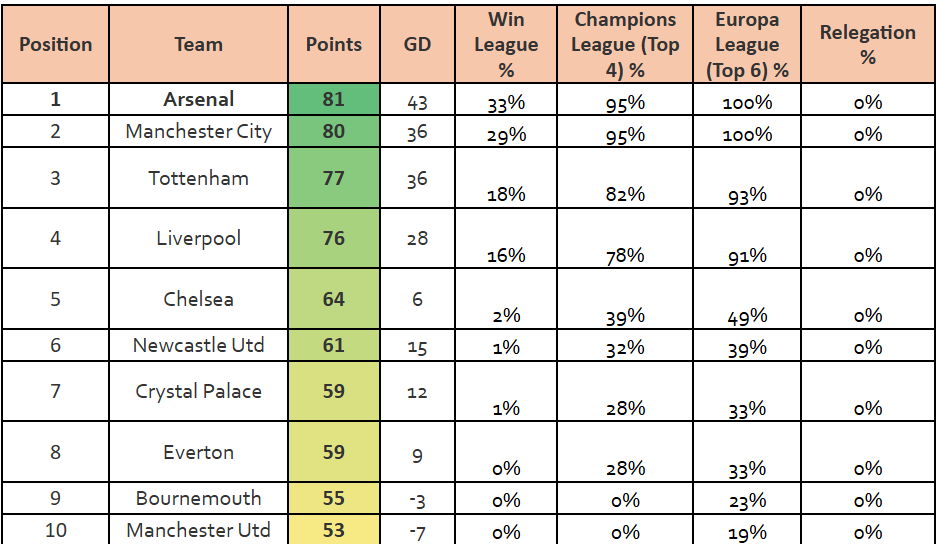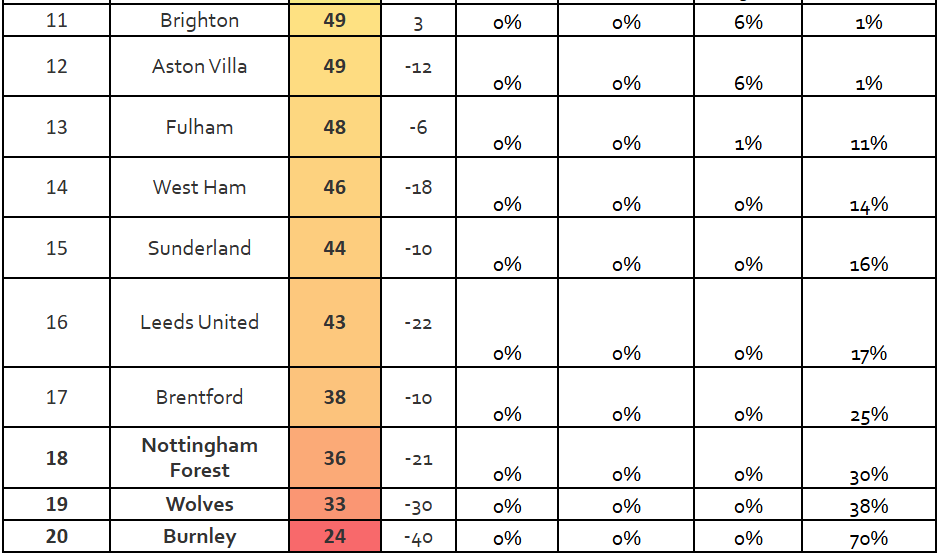
Arsenal have moved ahead in the title race as the Gunners took advantage of a consecutive Liverpool loss by beating West Ham 2-0 last weekend.
With Arsenal on top of the table heading into the international break, the football statisticians at 247Bet have run their predictive Supercomputer to reveal how the end-of-season table will look, and it’s good news for Gunners fans.
Key Findings:
- Arsenal are predicted to end a 22-year wait to win the Premier League title, doing so with 81 points, and a league-best goal difference of +43.
- The Supercomputer has given Arsenal a 33% chance of winning this season’s Premier League, making Mikel Arteta’s side the favourites for the title.
- However, only five points will separate the four sides in the title race after 38 games, including just a one-point gap between champions Arsenal and second placed Manchester City.
- Tottenham are predicted to clinch third place with 77 points, but Thomas Frank’s team still have an 18% chance of being surprise Premier League champions come May.
- The defending champions Liverpool are expected to finish in fourth place, and have been given just a 16% chance of winning back-to-back Premier Leagues.
Supercomputer makes bold predictions on the 2025/26 title race after Gunners gain the advantage
- Arsenal have been crowned the most likely (33%) side to win the Premier League this season, ending a 22-year wait for the title. The Gunners have been estimated to secure 81 points, and have the best goal difference in the league with +43.
- Manchester City, who have a 29% chance of glory, will finish second in this season’s title race but just one point behind Arsenal. However, securing European competition looks very likely, with the Supercomputer giving City a 95% chance of qualifying for the Champions League.
- Liverpool will place fourth after 38 games, finishing the season on 76 points. However, Arne Slot’s side will only be five points behind champions Arsenal, and still have a 16% chance of defending their crown, indicating a title race that will go down to the final few games.
- The Supercomputer predicts that both North London sides will surpass Liverpool with Tottenham rising 14 positions from last season’s effort into third place. After 10,000 simulations, Thomas Frank’s Spurs have been given an 18% chance of winning the Premier League in 2025/26.
- Predicted to place 5th by the Supercomputer, Chelsea will miss out on a spot in the top four, while Newcastle will finish in 6th place.
- Manchester United returned to the top half of the table, finishing in 10th place with 53 points. There’s also a 19% chance that the Red Devils will reach the Europa League, according to the Supercomputer.
- Nottingham Forest’s disappointing start to the season has resulted in the Supercomputer predicting a 30% chance of the club being relegated during Ange Postecoglou’s first season. This made Forest the third-most likely side to go down in 2025/26.
- Wolves and Burnley will join Nottingham Forest in facing the drop, finishing 19th and 20th respectively. The Clarets were given a very damning 70% chance of going down by the Supercomputer.
- Sunderland (15th) and Leeds (16th) are set to become the first promoted sides to stay up in three years. The promoted clubs combined predicted points haul of 87 outweighs the 59 points managed by all three promoted teams combined in 2024/25.
- The Supercomputer expects Brentford to finish 17th, and just two points ahead of Nottingham Forest, indicating that the race for survival will go down to the wire this season.


The Science Behind the Supercomputer:
The supercomputer adopts the Monte Carlo method, at its heart is a Python-based match simulator that uses two Poisson distributions – one for the home team and one for the away team – to anticipate the number of goals each team could score in a match.
A Poisson distribution is a powerful mathematical concept that predicts the probability of a given number of events (in this case, goals) happening in a fixed interval of time. The key input to a Poisson distribution is the ‘lambda’ (λ) value, which represents the average rate of an event’s occurrence.
Let’s break this down using an example of Manchester City playing at home against Arsenal:
In our simulator, we first compute the λ for Man City, using both xG (Expected Goals) and actual goals scored per match based on their last 19 home games. This gives us an ‘attacking lambda’. For instance, with an xG of 2.24 and actual goals per match of 3.16 whilst playing at the Etihad Stadium, Man City’s attacking λ is: 2.7 – both xG and goals are used to measure both underlying and actual performance.
Next, we calculate Arsenal’s ‘defensive lambda’ based on their last 19 away games from their average goals conceded per game (0.95) and xGA (1.2) whilst on the road, giving a value of 1.08.
To tailor these λ values to the specific match-up, we adjust Man City’s attacking λ by factoring in the strength of Arsenal’s defence. We do this by calculating a multiplier, which is the ratio of Arsenal’s defensive λ to the league average defensive λ (1.54).
Multiplying Man City’s λ (2.7) by this factor adjusts it for Arsenal’s specific defensive strength. This adjusted λ better represents Man City’s goal-scoring likelihood against Arsenal. The same process is replicated for the away team.
In formulaic terms:
Home team λ = home team attacking λ * (away team defensive λ / league average away defensive λ)
Away team λ = away team attacking λ * (home team defensive λ / league average home defensive λ)